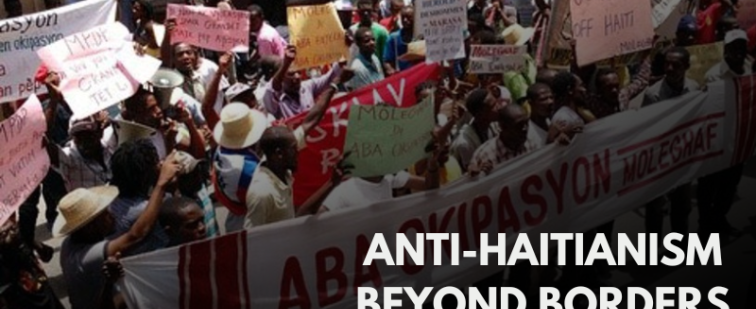Home
This edited transcript is of a talk given by Colombian journalist Hollman Morris at Georgetown University in Washington. Morris spoke in protest of the appointment of former Colombian president Álvaro Uribe as a "distinguished scholar" at Georgetown. As the host and editorial director of Contravía, a weekly investigative news show, Morris has regularly taken on the Colombian government for the myriad human rights abuses committed in the last decade by the country’s military and its paramilitary allies. This work has earned him many awards internationally, but he also was targeted by Uribe's intelligence service as a part of a surveillance program and smear campaign.
This originally appeared in the January/February 2011 edition of NACLA Report on the Americas.
Christmas in Bolivia was short-lived last year, as tens of thousands thronged to the streets to protest the gasolinazo, a massive increase in gasoline prices provoked by the MAS government’s abrupt cancellation of fuel subsidies on December 26. Five days later, the government was forced to rescind the decree amidst the first massive popular uprising against a leftist government.
We have collected in this Report a series of articles analyzing these 21st-century coups in the Americas—in Venezuela (2002), Haiti (2004), and Honduras (2009)—against the backdrop of popular movements for democracy and economic justice. The fight to overcome neoliberalism in the region has produced not only left-leaning governments but, perhaps more significantly, a widespread, commonsensical respect among citizens for transparent, democratic norms and institutionality. Coups are seen as an extra-legal retrogression to a barbarous past. The dark days of the region's late-20th-century military dictatorships, which came to power through U.S.-sponsored coups, comprise a sinister legacy that continues to inform how leaders and social movements in the region frame current events. Coups, and the threat of coups, are still a part of the Latin American reality, even in the 21st century.
On February 8, Felix Cuc Xo, a community activist from Alta Verapaz, Guatemala, was beaten in front of his family and taken away by soldiers and police. His shadowy detention took place under the cover of Alta Verapaz’s martial law, which was decreed in December as an anti-narcotic operation. The remilitarization of an area hit hard by the country's armed conflict (that ended in 1996) is also quelling social movement organizing in the region.
During El Salvador’s 2003–04 presidential campaign season, ads appeared on Salvadoran televisions featuring U.S. Republican congressional representatives. Praising the right-wing ARENA party candidate Tony Saca, who eventually won the election, the U.S. officials warned Salvadoran voters that a victory by the left-wing opposition party, the FMLN, would result in their U.S.-based relatives being deported and their remittances being cut off. In light of the 2004 experience, an L.A.-based group founded in 1999 by Salvadoran American labor and immigrant rights leaders, decided not only to participate as electoral observers in El Salvador’s 2009 presidential election but also to pressure the U.S. government to remain neutral. This article originally appeared in the November/December 2010 edition of NACLA Report on the Americas.
More than a year has passed since Haiti’s 2010 earthquake, along with one of the largest international relief efforts in modern history. Yet, for many people in Haiti today, little has changed, and for many others life has become worse. While the uncontrollable forces of nature can be blamed for the death and destruction of the earthquake, the extreme vulnerability of the nation both before and after the disaster was entirely man-made, and a continuation of a lengthy history of self-interested foreign intervention in their country.
In December the DREAM Act failed to get the “super majority” of 60 votes required for closure in the U.S. Senate. It would have provided more than two million undocumented youth a legal pathway to obtain U.S. citizenship upon meeting eligibility requirements. Despite this, DREAMers (a term used to refer to those who would fall under the legislation) appear unrelenting in their determination to continue their struggle to push for the rights of immigrant youth.
Colombia's judicial and executive inconsistency in the case of ex-Senator Piedad Córdoba, who had her senatorial credentials revoked in September, underscores the Colombian government's rejection to accept or pursue any non-military solutions to the ongoing internal conflict. As is illustrated with the Córdoba case, the neglect of peaceful strategies coincides with the increased use of political subversion by the state to spy on, target, and ultimately remove any dissenting voices from the national political discourse.
On December 10, President Evo Morales promulgated Bolivia’s new pension law at the headquarters of the Bolivian Workers Central (COB), the country’s militant national trade union federation. The unprecedented and highly symbolic event culminated a four-year negotiating process, during which the COB agreed to suspend its mobilization for higher wages in exchange for comprehensive pension reform.
From November 24 through 28, police and military staged Rio de Janeiro’s largest armed offensive against drug traffickers in decades. The operation has been hailed as a turning point in Rio’s efforts to improve security before it hosts the 2016 Olympic games. However, the perception of greater public safety in Rio is credible only to those willing to look past both the human rights abuses carried out in its midst and the systematic corruption among Rio police that is linked to much of the major crime in the city.












